Advice on Expectation Gap and Audit Independence
VerifiedAdded on 2022/10/12
|9
|1812
|480
AI Summary
This memo provides advice on expectation gap and audit independence. It explains the concept of audit expectation gap and how it can affect the audit engagement. It also discusses the threats to audit independence and the necessary safeguards against these threats. The memo is addressed to William Albanese, the Audit Manager of Samway Baker Fitzgerald (SBF).
Contribute Materials
Your contribution can guide someone’s learning journey. Share your
documents today.
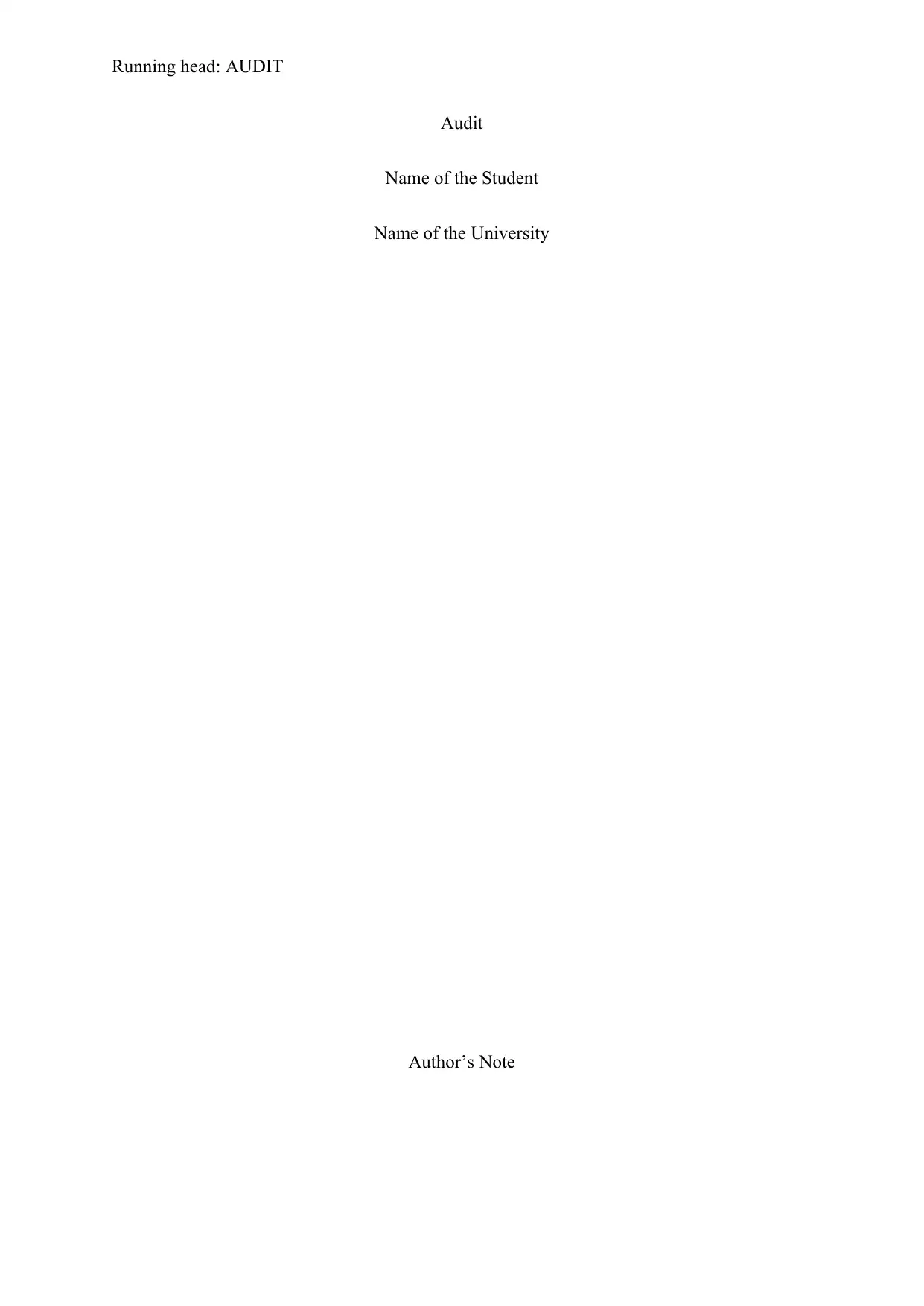
Running head: AUDIT
Audit
Name of the Student
Name of the University
Author’s Note
Audit
Name of the Student
Name of the University
Author’s Note
Secure Best Marks with AI Grader
Need help grading? Try our AI Grader for instant feedback on your assignments.
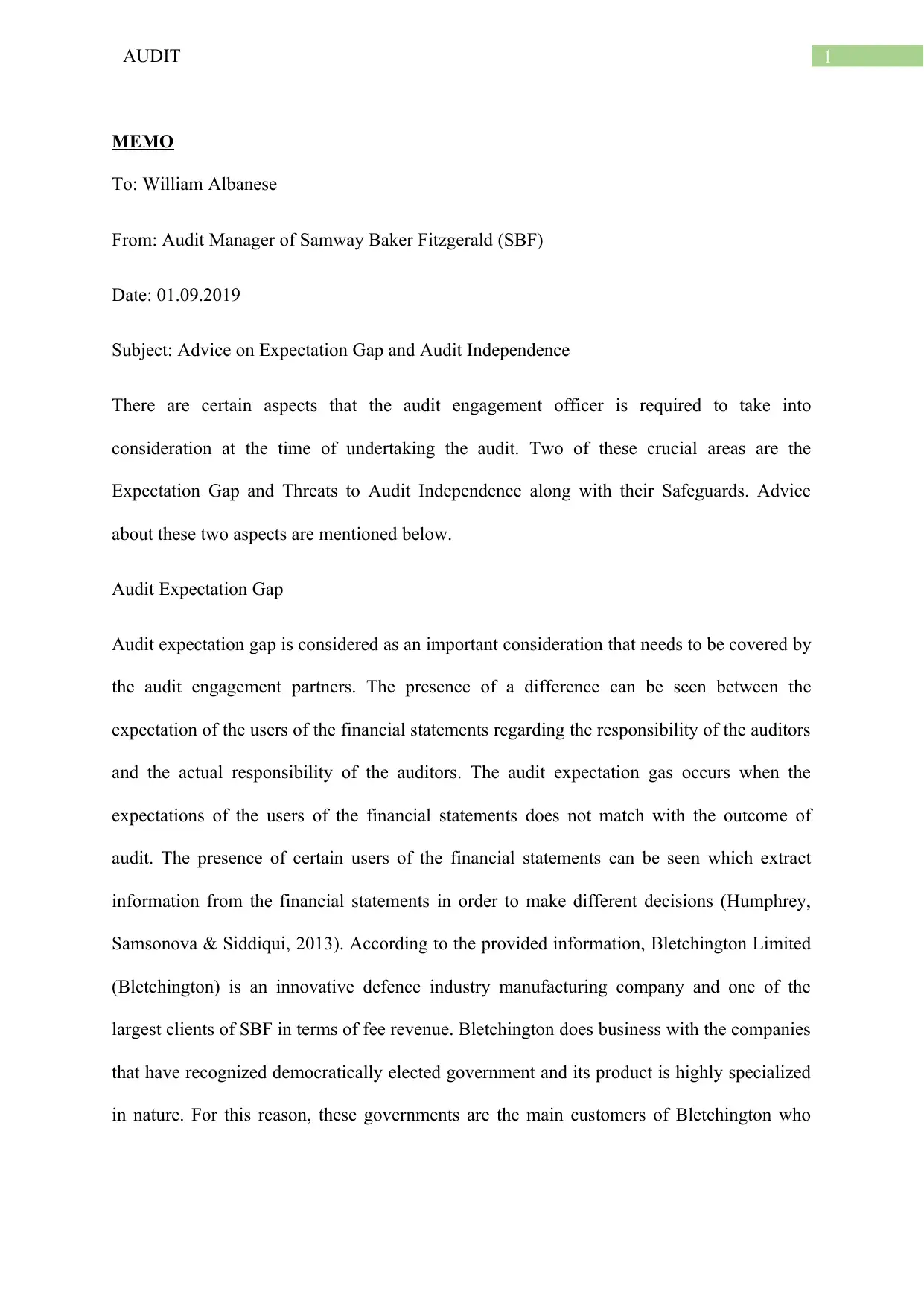
1AUDIT
MEMO
To: William Albanese
From: Audit Manager of Samway Baker Fitzgerald (SBF)
Date: 01.09.2019
Subject: Advice on Expectation Gap and Audit Independence
There are certain aspects that the audit engagement officer is required to take into
consideration at the time of undertaking the audit. Two of these crucial areas are the
Expectation Gap and Threats to Audit Independence along with their Safeguards. Advice
about these two aspects are mentioned below.
Audit Expectation Gap
Audit expectation gap is considered as an important consideration that needs to be covered by
the audit engagement partners. The presence of a difference can be seen between the
expectation of the users of the financial statements regarding the responsibility of the auditors
and the actual responsibility of the auditors. The audit expectation gas occurs when the
expectations of the users of the financial statements does not match with the outcome of
audit. The presence of certain users of the financial statements can be seen which extract
information from the financial statements in order to make different decisions (Humphrey,
Samsonova & Siddiqui, 2013). According to the provided information, Bletchington Limited
(Bletchington) is an innovative defence industry manufacturing company and one of the
largest clients of SBF in terms of fee revenue. Bletchington does business with the companies
that have recognized democratically elected government and its product is highly specialized
in nature. For this reason, these governments are the main customers of Bletchington who
MEMO
To: William Albanese
From: Audit Manager of Samway Baker Fitzgerald (SBF)
Date: 01.09.2019
Subject: Advice on Expectation Gap and Audit Independence
There are certain aspects that the audit engagement officer is required to take into
consideration at the time of undertaking the audit. Two of these crucial areas are the
Expectation Gap and Threats to Audit Independence along with their Safeguards. Advice
about these two aspects are mentioned below.
Audit Expectation Gap
Audit expectation gap is considered as an important consideration that needs to be covered by
the audit engagement partners. The presence of a difference can be seen between the
expectation of the users of the financial statements regarding the responsibility of the auditors
and the actual responsibility of the auditors. The audit expectation gas occurs when the
expectations of the users of the financial statements does not match with the outcome of
audit. The presence of certain users of the financial statements can be seen which extract
information from the financial statements in order to make different decisions (Humphrey,
Samsonova & Siddiqui, 2013). According to the provided information, Bletchington Limited
(Bletchington) is an innovative defence industry manufacturing company and one of the
largest clients of SBF in terms of fee revenue. Bletchington does business with the companies
that have recognized democratically elected government and its product is highly specialized
in nature. For this reason, these governments are the main customers of Bletchington who
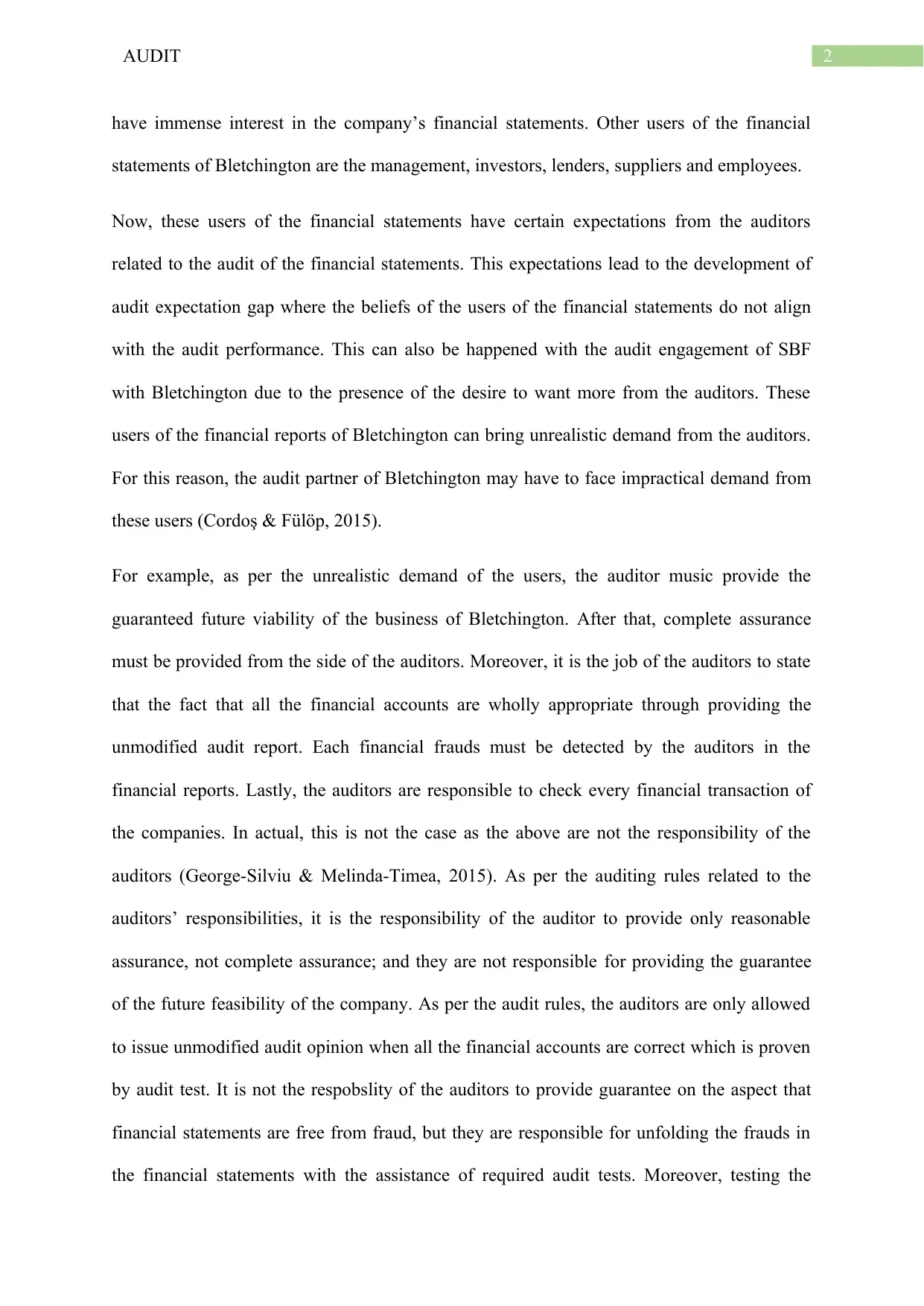
2AUDIT
have immense interest in the company’s financial statements. Other users of the financial
statements of Bletchington are the management, investors, lenders, suppliers and employees.
Now, these users of the financial statements have certain expectations from the auditors
related to the audit of the financial statements. This expectations lead to the development of
audit expectation gap where the beliefs of the users of the financial statements do not align
with the audit performance. This can also be happened with the audit engagement of SBF
with Bletchington due to the presence of the desire to want more from the auditors. These
users of the financial reports of Bletchington can bring unrealistic demand from the auditors.
For this reason, the audit partner of Bletchington may have to face impractical demand from
these users (Cordoş & Fülöp, 2015).
For example, as per the unrealistic demand of the users, the auditor music provide the
guaranteed future viability of the business of Bletchington. After that, complete assurance
must be provided from the side of the auditors. Moreover, it is the job of the auditors to state
that the fact that all the financial accounts are wholly appropriate through providing the
unmodified audit report. Each financial frauds must be detected by the auditors in the
financial reports. Lastly, the auditors are responsible to check every financial transaction of
the companies. In actual, this is not the case as the above are not the responsibility of the
auditors (George-Silviu & Melinda-Timea, 2015). As per the auditing rules related to the
auditors’ responsibilities, it is the responsibility of the auditor to provide only reasonable
assurance, not complete assurance; and they are not responsible for providing the guarantee
of the future feasibility of the company. As per the audit rules, the auditors are only allowed
to issue unmodified audit opinion when all the financial accounts are correct which is proven
by audit test. It is not the respobslity of the auditors to provide guarantee on the aspect that
financial statements are free from fraud, but they are responsible for unfolding the frauds in
the financial statements with the assistance of required audit tests. Moreover, testing the
have immense interest in the company’s financial statements. Other users of the financial
statements of Bletchington are the management, investors, lenders, suppliers and employees.
Now, these users of the financial statements have certain expectations from the auditors
related to the audit of the financial statements. This expectations lead to the development of
audit expectation gap where the beliefs of the users of the financial statements do not align
with the audit performance. This can also be happened with the audit engagement of SBF
with Bletchington due to the presence of the desire to want more from the auditors. These
users of the financial reports of Bletchington can bring unrealistic demand from the auditors.
For this reason, the audit partner of Bletchington may have to face impractical demand from
these users (Cordoş & Fülöp, 2015).
For example, as per the unrealistic demand of the users, the auditor music provide the
guaranteed future viability of the business of Bletchington. After that, complete assurance
must be provided from the side of the auditors. Moreover, it is the job of the auditors to state
that the fact that all the financial accounts are wholly appropriate through providing the
unmodified audit report. Each financial frauds must be detected by the auditors in the
financial reports. Lastly, the auditors are responsible to check every financial transaction of
the companies. In actual, this is not the case as the above are not the responsibility of the
auditors (George-Silviu & Melinda-Timea, 2015). As per the auditing rules related to the
auditors’ responsibilities, it is the responsibility of the auditor to provide only reasonable
assurance, not complete assurance; and they are not responsible for providing the guarantee
of the future feasibility of the company. As per the audit rules, the auditors are only allowed
to issue unmodified audit opinion when all the financial accounts are correct which is proven
by audit test. It is not the respobslity of the auditors to provide guarantee on the aspect that
financial statements are free from fraud, but they are responsible for unfolding the frauds in
the financial statements with the assistance of required audit tests. Moreover, testing the
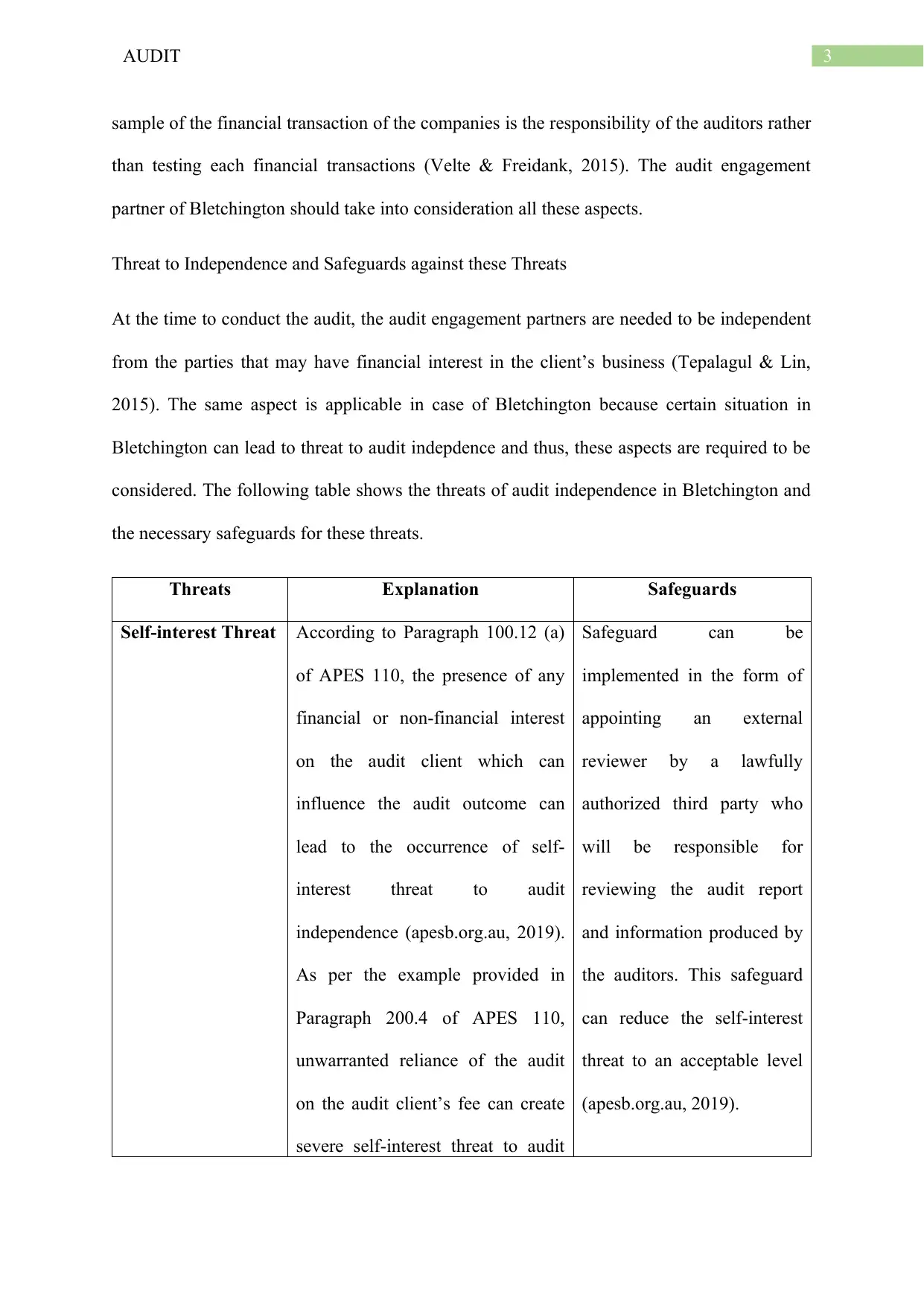
3AUDIT
sample of the financial transaction of the companies is the responsibility of the auditors rather
than testing each financial transactions (Velte & Freidank, 2015). The audit engagement
partner of Bletchington should take into consideration all these aspects.
Threat to Independence and Safeguards against these Threats
At the time to conduct the audit, the audit engagement partners are needed to be independent
from the parties that may have financial interest in the client’s business (Tepalagul & Lin,
2015). The same aspect is applicable in case of Bletchington because certain situation in
Bletchington can lead to threat to audit indepdence and thus, these aspects are required to be
considered. The following table shows the threats of audit independence in Bletchington and
the necessary safeguards for these threats.
Threats Explanation Safeguards
Self-interest Threat According to Paragraph 100.12 (a)
of APES 110, the presence of any
financial or non-financial interest
on the audit client which can
influence the audit outcome can
lead to the occurrence of self-
interest threat to audit
independence (apesb.org.au, 2019).
As per the example provided in
Paragraph 200.4 of APES 110,
unwarranted reliance of the audit
on the audit client’s fee can create
severe self-interest threat to audit
Safeguard can be
implemented in the form of
appointing an external
reviewer by a lawfully
authorized third party who
will be responsible for
reviewing the audit report
and information produced by
the auditors. This safeguard
can reduce the self-interest
threat to an acceptable level
(apesb.org.au, 2019).
sample of the financial transaction of the companies is the responsibility of the auditors rather
than testing each financial transactions (Velte & Freidank, 2015). The audit engagement
partner of Bletchington should take into consideration all these aspects.
Threat to Independence and Safeguards against these Threats
At the time to conduct the audit, the audit engagement partners are needed to be independent
from the parties that may have financial interest in the client’s business (Tepalagul & Lin,
2015). The same aspect is applicable in case of Bletchington because certain situation in
Bletchington can lead to threat to audit indepdence and thus, these aspects are required to be
considered. The following table shows the threats of audit independence in Bletchington and
the necessary safeguards for these threats.
Threats Explanation Safeguards
Self-interest Threat According to Paragraph 100.12 (a)
of APES 110, the presence of any
financial or non-financial interest
on the audit client which can
influence the audit outcome can
lead to the occurrence of self-
interest threat to audit
independence (apesb.org.au, 2019).
As per the example provided in
Paragraph 200.4 of APES 110,
unwarranted reliance of the audit
on the audit client’s fee can create
severe self-interest threat to audit
Safeguard can be
implemented in the form of
appointing an external
reviewer by a lawfully
authorized third party who
will be responsible for
reviewing the audit report
and information produced by
the auditors. This safeguard
can reduce the self-interest
threat to an acceptable level
(apesb.org.au, 2019).
Secure Best Marks with AI Grader
Need help grading? Try our AI Grader for instant feedback on your assignments.
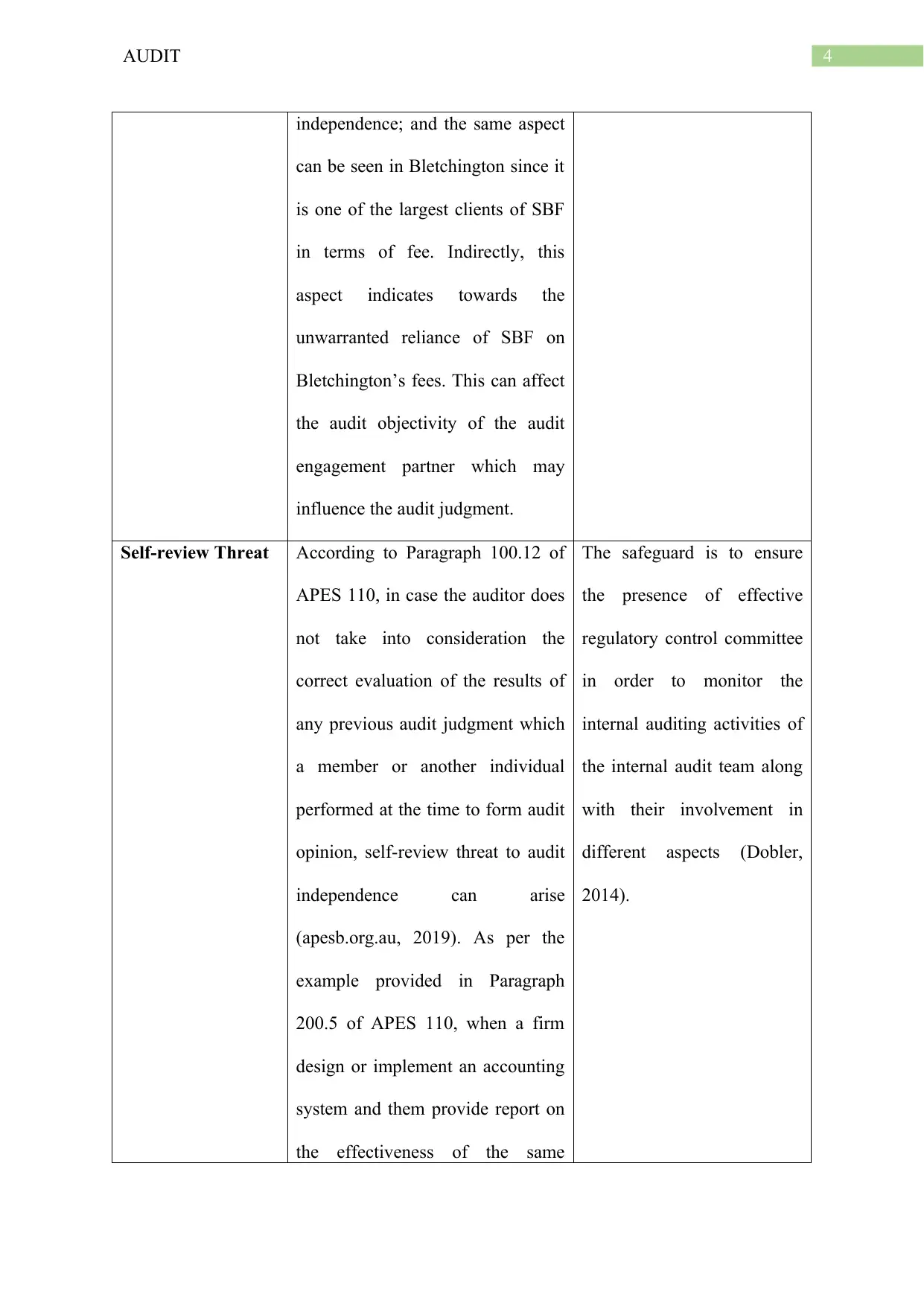
4AUDIT
independence; and the same aspect
can be seen in Bletchington since it
is one of the largest clients of SBF
in terms of fee. Indirectly, this
aspect indicates towards the
unwarranted reliance of SBF on
Bletchington’s fees. This can affect
the audit objectivity of the audit
engagement partner which may
influence the audit judgment.
Self-review Threat According to Paragraph 100.12 of
APES 110, in case the auditor does
not take into consideration the
correct evaluation of the results of
any previous audit judgment which
a member or another individual
performed at the time to form audit
opinion, self-review threat to audit
independence can arise
(apesb.org.au, 2019). As per the
example provided in Paragraph
200.5 of APES 110, when a firm
design or implement an accounting
system and them provide report on
the effectiveness of the same
The safeguard is to ensure
the presence of effective
regulatory control committee
in order to monitor the
internal auditing activities of
the internal audit team along
with their involvement in
different aspects (Dobler,
2014).
independence; and the same aspect
can be seen in Bletchington since it
is one of the largest clients of SBF
in terms of fee. Indirectly, this
aspect indicates towards the
unwarranted reliance of SBF on
Bletchington’s fees. This can affect
the audit objectivity of the audit
engagement partner which may
influence the audit judgment.
Self-review Threat According to Paragraph 100.12 of
APES 110, in case the auditor does
not take into consideration the
correct evaluation of the results of
any previous audit judgment which
a member or another individual
performed at the time to form audit
opinion, self-review threat to audit
independence can arise
(apesb.org.au, 2019). As per the
example provided in Paragraph
200.5 of APES 110, when a firm
design or implement an accounting
system and them provide report on
the effectiveness of the same
The safeguard is to ensure
the presence of effective
regulatory control committee
in order to monitor the
internal auditing activities of
the internal audit team along
with their involvement in
different aspects (Dobler,
2014).
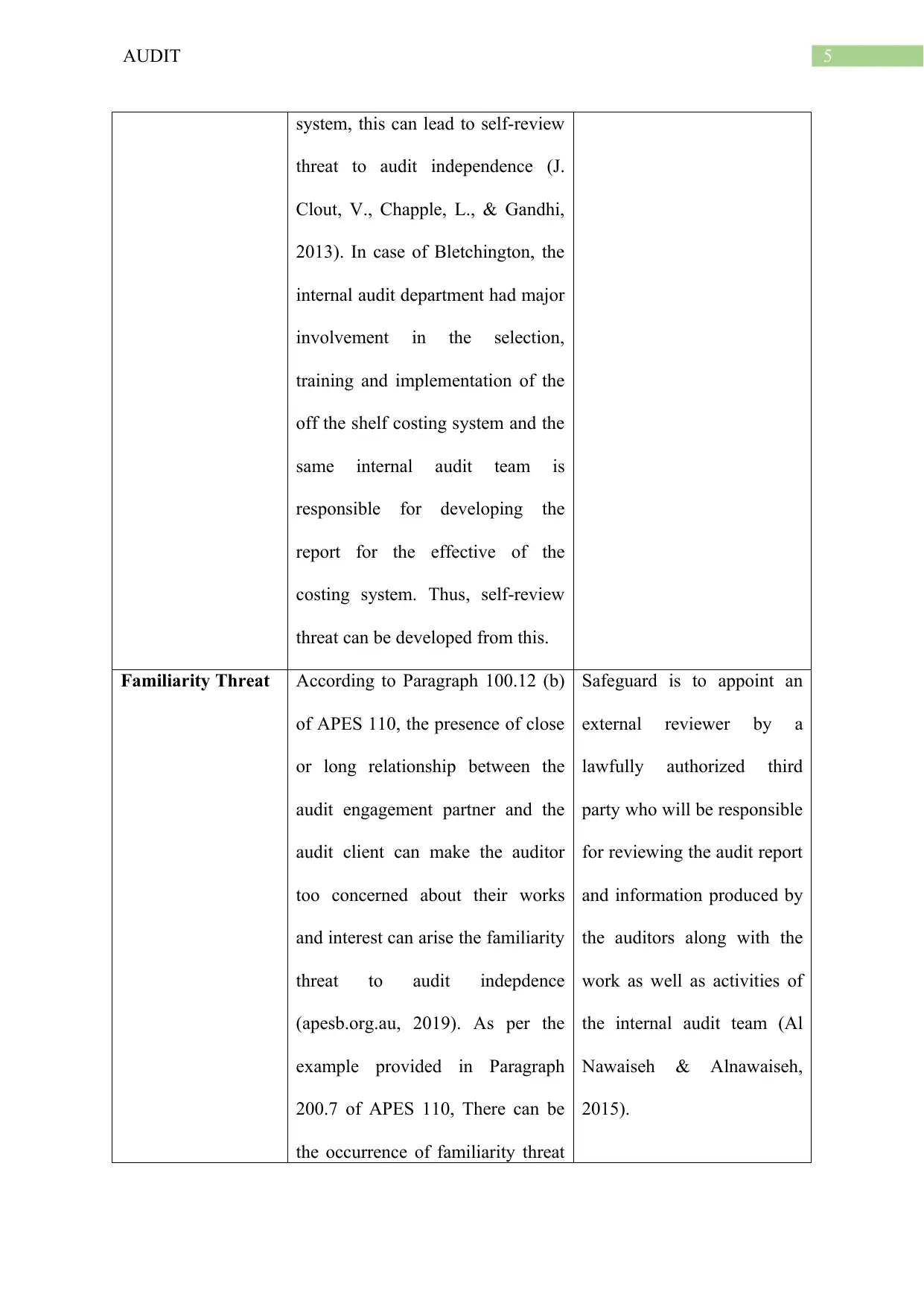
5AUDIT
system, this can lead to self-review
threat to audit independence (J.
Clout, V., Chapple, L., & Gandhi,
2013). In case of Bletchington, the
internal audit department had major
involvement in the selection,
training and implementation of the
off the shelf costing system and the
same internal audit team is
responsible for developing the
report for the effective of the
costing system. Thus, self-review
threat can be developed from this.
Familiarity Threat According to Paragraph 100.12 (b)
of APES 110, the presence of close
or long relationship between the
audit engagement partner and the
audit client can make the auditor
too concerned about their works
and interest can arise the familiarity
threat to audit indepdence
(apesb.org.au, 2019). As per the
example provided in Paragraph
200.7 of APES 110, There can be
the occurrence of familiarity threat
Safeguard is to appoint an
external reviewer by a
lawfully authorized third
party who will be responsible
for reviewing the audit report
and information produced by
the auditors along with the
work as well as activities of
the internal audit team (Al
Nawaiseh & Alnawaiseh,
2015).
system, this can lead to self-review
threat to audit independence (J.
Clout, V., Chapple, L., & Gandhi,
2013). In case of Bletchington, the
internal audit department had major
involvement in the selection,
training and implementation of the
off the shelf costing system and the
same internal audit team is
responsible for developing the
report for the effective of the
costing system. Thus, self-review
threat can be developed from this.
Familiarity Threat According to Paragraph 100.12 (b)
of APES 110, the presence of close
or long relationship between the
audit engagement partner and the
audit client can make the auditor
too concerned about their works
and interest can arise the familiarity
threat to audit indepdence
(apesb.org.au, 2019). As per the
example provided in Paragraph
200.7 of APES 110, There can be
the occurrence of familiarity threat
Safeguard is to appoint an
external reviewer by a
lawfully authorized third
party who will be responsible
for reviewing the audit report
and information produced by
the auditors along with the
work as well as activities of
the internal audit team (Al
Nawaiseh & Alnawaiseh,
2015).
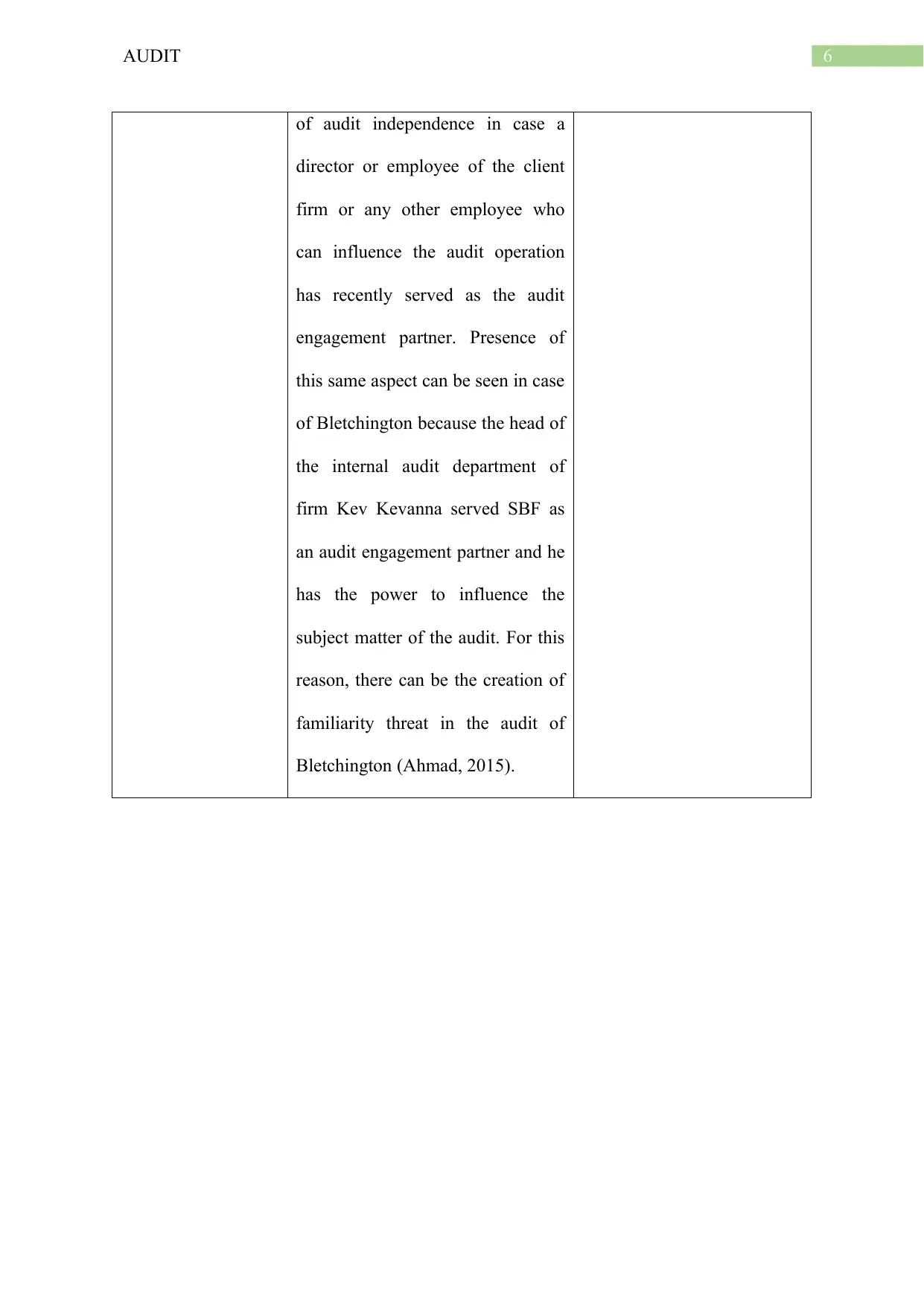
6AUDIT
of audit independence in case a
director or employee of the client
firm or any other employee who
can influence the audit operation
has recently served as the audit
engagement partner. Presence of
this same aspect can be seen in case
of Bletchington because the head of
the internal audit department of
firm Kev Kevanna served SBF as
an audit engagement partner and he
has the power to influence the
subject matter of the audit. For this
reason, there can be the creation of
familiarity threat in the audit of
Bletchington (Ahmad, 2015).
of audit independence in case a
director or employee of the client
firm or any other employee who
can influence the audit operation
has recently served as the audit
engagement partner. Presence of
this same aspect can be seen in case
of Bletchington because the head of
the internal audit department of
firm Kev Kevanna served SBF as
an audit engagement partner and he
has the power to influence the
subject matter of the audit. For this
reason, there can be the creation of
familiarity threat in the audit of
Bletchington (Ahmad, 2015).
Paraphrase This Document
Need a fresh take? Get an instant paraphrase of this document with our AI Paraphraser
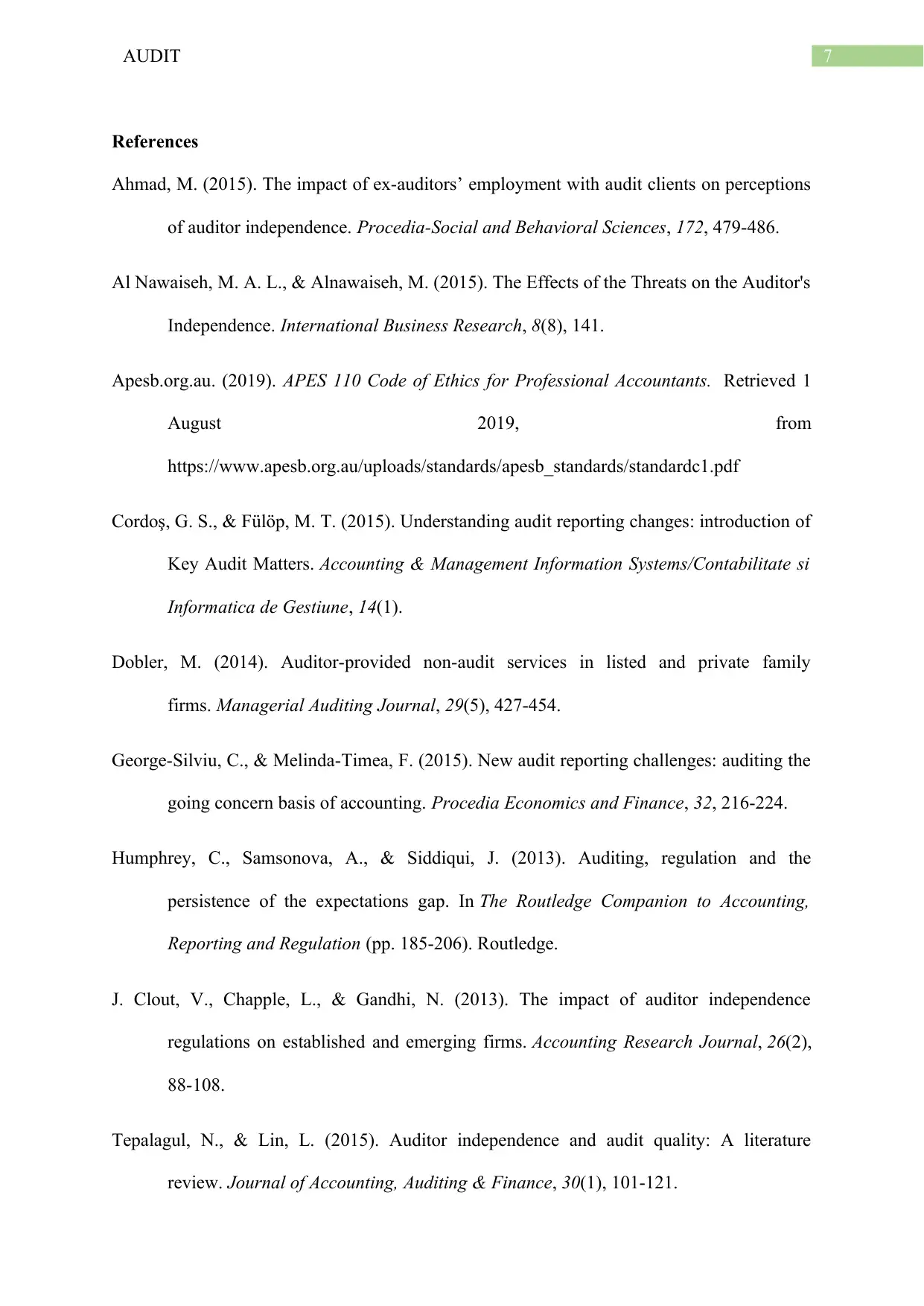
7AUDIT
References
Ahmad, M. (2015). The impact of ex-auditors’ employment with audit clients on perceptions
of auditor independence. Procedia-Social and Behavioral Sciences, 172, 479-486.
Al Nawaiseh, M. A. L., & Alnawaiseh, M. (2015). The Effects of the Threats on the Auditor's
Independence. International Business Research, 8(8), 141.
Apesb.org.au. (2019). APES 110 Code of Ethics for Professional Accountants. Retrieved 1
August 2019, from
https://www.apesb.org.au/uploads/standards/apesb_standards/standardc1.pdf
Cordoş, G. S., & Fülöp, M. T. (2015). Understanding audit reporting changes: introduction of
Key Audit Matters. Accounting & Management Information Systems/Contabilitate si
Informatica de Gestiune, 14(1).
Dobler, M. (2014). Auditor-provided non-audit services in listed and private family
firms. Managerial Auditing Journal, 29(5), 427-454.
George-Silviu, C., & Melinda-Timea, F. (2015). New audit reporting challenges: auditing the
going concern basis of accounting. Procedia Economics and Finance, 32, 216-224.
Humphrey, C., Samsonova, A., & Siddiqui, J. (2013). Auditing, regulation and the
persistence of the expectations gap. In The Routledge Companion to Accounting,
Reporting and Regulation (pp. 185-206). Routledge.
J. Clout, V., Chapple, L., & Gandhi, N. (2013). The impact of auditor independence
regulations on established and emerging firms. Accounting Research Journal, 26(2),
88-108.
Tepalagul, N., & Lin, L. (2015). Auditor independence and audit quality: A literature
review. Journal of Accounting, Auditing & Finance, 30(1), 101-121.
References
Ahmad, M. (2015). The impact of ex-auditors’ employment with audit clients on perceptions
of auditor independence. Procedia-Social and Behavioral Sciences, 172, 479-486.
Al Nawaiseh, M. A. L., & Alnawaiseh, M. (2015). The Effects of the Threats on the Auditor's
Independence. International Business Research, 8(8), 141.
Apesb.org.au. (2019). APES 110 Code of Ethics for Professional Accountants. Retrieved 1
August 2019, from
https://www.apesb.org.au/uploads/standards/apesb_standards/standardc1.pdf
Cordoş, G. S., & Fülöp, M. T. (2015). Understanding audit reporting changes: introduction of
Key Audit Matters. Accounting & Management Information Systems/Contabilitate si
Informatica de Gestiune, 14(1).
Dobler, M. (2014). Auditor-provided non-audit services in listed and private family
firms. Managerial Auditing Journal, 29(5), 427-454.
George-Silviu, C., & Melinda-Timea, F. (2015). New audit reporting challenges: auditing the
going concern basis of accounting. Procedia Economics and Finance, 32, 216-224.
Humphrey, C., Samsonova, A., & Siddiqui, J. (2013). Auditing, regulation and the
persistence of the expectations gap. In The Routledge Companion to Accounting,
Reporting and Regulation (pp. 185-206). Routledge.
J. Clout, V., Chapple, L., & Gandhi, N. (2013). The impact of auditor independence
regulations on established and emerging firms. Accounting Research Journal, 26(2),
88-108.
Tepalagul, N., & Lin, L. (2015). Auditor independence and audit quality: A literature
review. Journal of Accounting, Auditing & Finance, 30(1), 101-121.
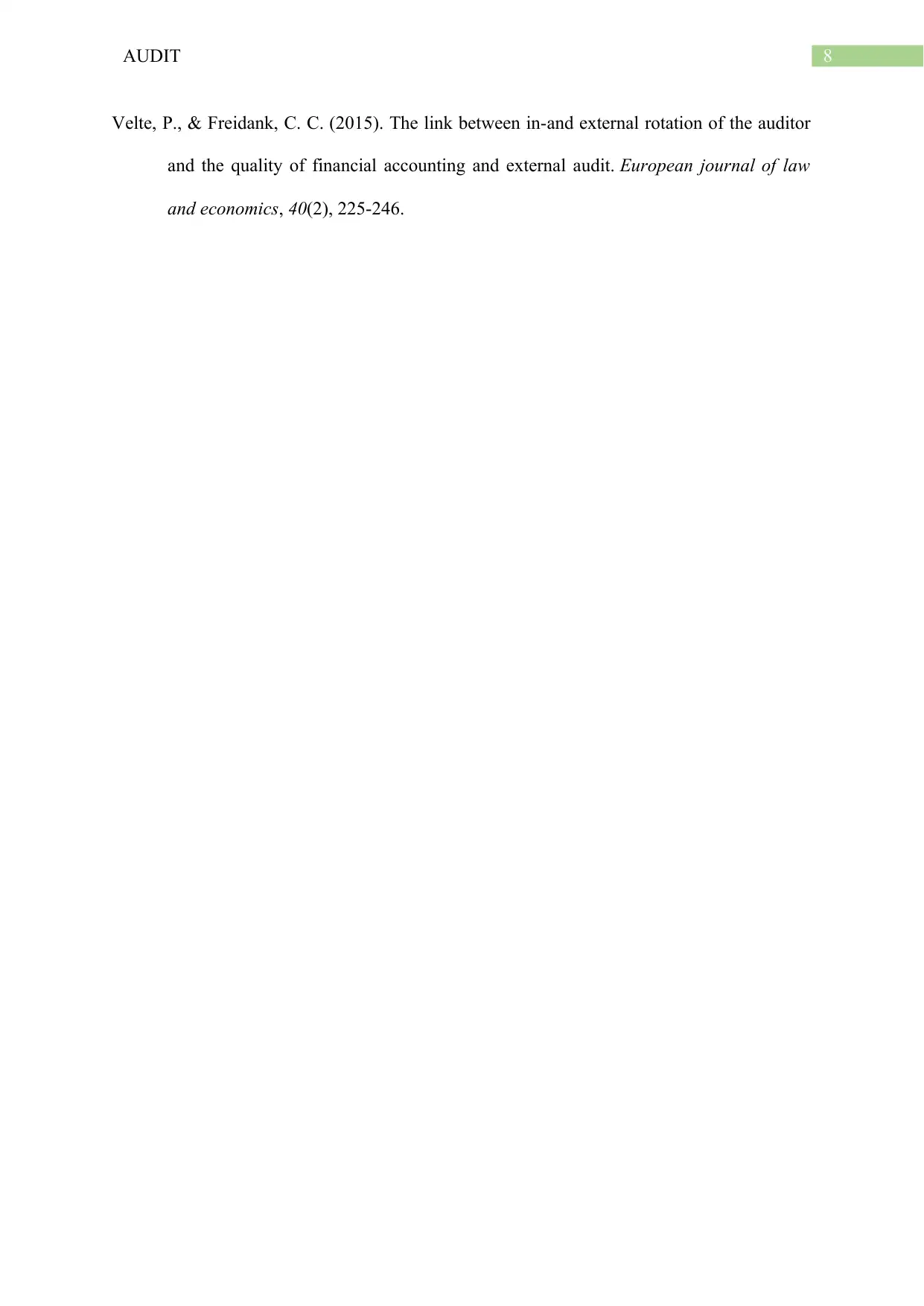
8AUDIT
Velte, P., & Freidank, C. C. (2015). The link between in-and external rotation of the auditor
and the quality of financial accounting and external audit. European journal of law
and economics, 40(2), 225-246.
Velte, P., & Freidank, C. C. (2015). The link between in-and external rotation of the auditor
and the quality of financial accounting and external audit. European journal of law
and economics, 40(2), 225-246.
1 out of 9
Related Documents
Your All-in-One AI-Powered Toolkit for Academic Success.
+13062052269
info@desklib.com
Available 24*7 on WhatsApp / Email
![[object Object]](/_next/static/media/star-bottom.7253800d.svg)
Unlock your academic potential
© 2024 | Zucol Services PVT LTD | All rights reserved.





